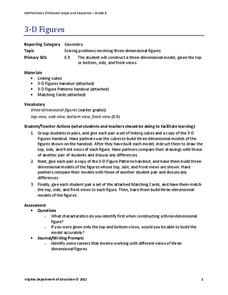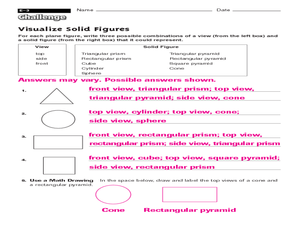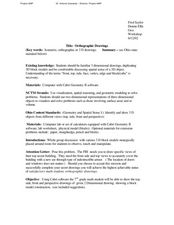Teach Engineering
Seeing All Sides: Orthographic Drawing
How can your draw three-dimensional figures on paper? The lesson shows pupils how to draw orthographic projections of three-dimensional figures composed of cubes. After viewing a PowerPoint presentation, they practice this skill with...
Curated OER
Three- and Two- Dimensional Geometry
In this three- and two- dimensional geometry worksheet, 7th graders solve 12 various problems related to geometric shapes and measurement. They first use paper and a pencil to sketch the front, side, back, top and bottom views of each...
Curated OER
A Different Point of View
Elementary schoolers utilize a pattern worksheet embedded in this plan to work on a deeper understanding of geometric concepts like symmetry and congruency. Since geometry is such a visual form of mathematics, this lesson should fit...
Mathed Up!
Nets, Plans, and Elevations
A dimensional resource teaches viewers to recognize 2-D views of 3-D objects and how to match nets with their 3-D figures. Individuals draw different views of three-dimensional objects including views from the front, side elevations and...
Curated OER
Hands On: Draw Views of Solid Figures
In this drawing views of solid figures practice worksheet, students sharpen their problem solving skills as they solve 6 story problems.
Virginia Department of Education
3-D Figures
Scholars construct three-dimensional figures to study dimension and side views. Learners build models using linking cubes to match views of different sides. After practicing with models, they attempt to match three-dimensional drawings...
Exploratorium
Building Three-Dimensional Structures
Are you looking for a good 3-D geometry lesson that includes hands-on activities for your middle schoolers? Look no further than this one! Pupils use centimeter grid paper embedded in the plan, along with detailed construction...
Curated OER
Castles On The Ground (2D & 3D Shapes)
Explore the relationship between 2D and 3D shapes by having your class view representation of shapes and investigate their symmetry. They will create a solid object from diagrams and describe the reflection or rotational symmetry. In the...
Curated OER
Unit Cubes
In this unit cube worksheet, students solve 3 different problems that contain various parts to each of them. First, they write as many 3-digit numbers as they can given the numbers 2, 3, 5, and 7. Then, students count how many unit cubes...
Curated OER
The Castle
Students build a castle to Ravi's design using the cubes. Students then make an original model of a solid object from diagrams which show views from the top, front, side and back. Students describe the reflection of rotational symmetry...
Curated OER
Two-Dimensional Drawings from Three Dimensional Objects
Sixth graders identify and replicate two dimensional illustrations of three dimensional objects. In this spatial visualization lesson, 6th graders practice viewing objects from various sides. Student participate in stations to view...
Curated OER
Visualize Solid Figures
In this solid figure worksheet, students write 3 possible combinations of views and a solid figure for a set of 3 plane figures. Students are given choices in a box at the top of the page. Students then draw and label top views of a cone...
Curated OER
2D Polygons and 3D Nets
Students compare and contrast two dimensional polygons and three dimentional nets by examining the differences in drawings. They create three dimensional shapes and label the faces, edges, and vertices. After creating the shapes, they...
Curated OER
Two-Dimensional Drawings from Three-Dimensional Objects
Sixth graders identify and draw two-dimensional representations of a three-dimensional object. Students investigate the views of an object and determine that three views are required (front, one side and the top). Students use these...
Curated OER
Three Dimensional Solids
In this geometry worksheet, 6th graders examine 3 isometric drawings and match them to 3 three-dimensional solids. They draw the front, side, and top views of 3 three dimensional solids by depicting the unit cubes that were used.
Curated OER
Symmetrical Journals
Young scholars examine the concept of symmetry by studying the symmetry of symbols in a wall painting and creating journals with a symmetrical design. After a class review of symmetry and identifying the line of symmetry in several...
Virginia Department of Education
Exploring 3-D Geometry
Take young mathematicians on an exploration of the world of 3-D geometry with this seven-lesson unit. After first defining the terms perimeter, area, and volume and how they apply to the real world, students continue on to learn the...
Curated OER
Polydron Fun
Students investigate nets as they relate to volume and area. In this geometry lesson, students use nets as a visual to deepen their understanding of surface area and volume of objects. They make conjectures about different objects and...
Curated OER
Orthographic Drawings
Students investigate the creation of three dimensional drawings. In this geometry instructional activity, students analyze and complete orthographic drawings. They Cabri software to manipulate and move the drawings around.
Curated OER
Orthographic Drawing
Young scholars investigate orthographic drawings. In this geometry lesson, students identify properties of three dimensional drawings in space. They solve problems using volume and area formulas.
Curated OER
Slides, Flips and Turns
Third graders slide, turn, and flip their bodies to explain sliding, turning, and flipping geometric shapes.
Curated OER
Measurement
Seventh graders measure surface area. In this geometry lesson, 7th graders find the surface area of various geometrical shapes. Using a computer program, students compute the area of 2-D and 3-D shapes. Students use graph paper to trace...
Curated OER
Using Technology To Teach Parallel Lines With Transversals
Students explore the relationships between angles formed by two lines cut by a transversal when lines are and are not parallel. They define key vocabulary terms, then using a camera take pictures at their school of parallel lines with...
Curated OER
Analyzing 3-D Shapes and 2-D Representations
Students can analyze 3-D objects better with actual physical models and by also drawing 2-D representations of them.

























